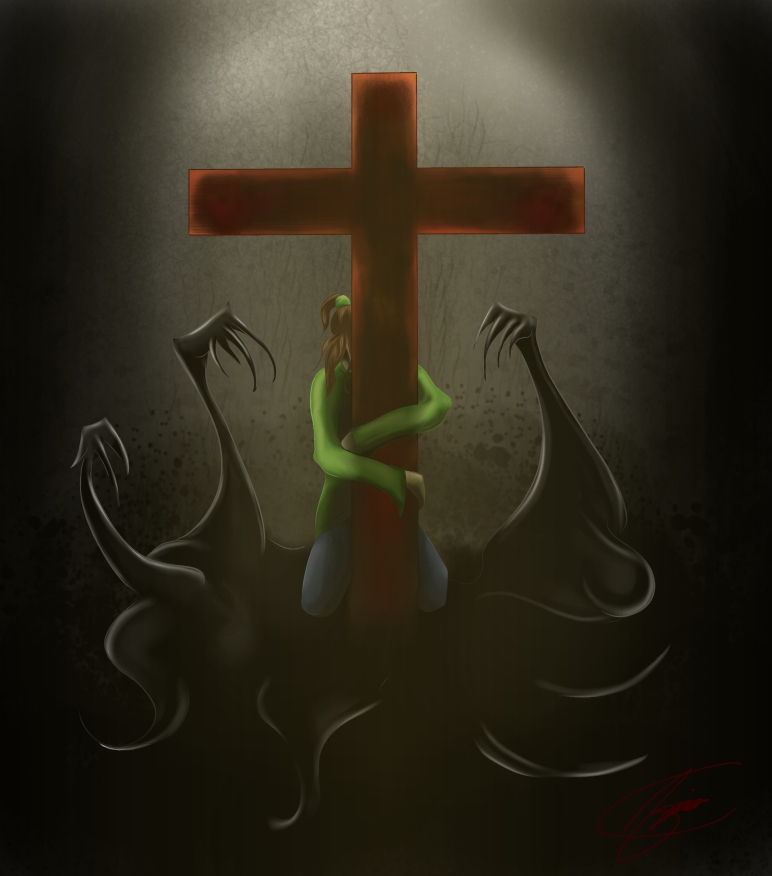“If any man would come after me, let him deny himself and take up his cross daily and follow me.” ~ Luke 9:23
Today was a beautiful Easter. I woke to sunshine streaming through my bedroom window — something all the more lovely since it was snowing the past two days. The above picture really doesn’t fit the mood of today in the slightest, but since I intend it to be the cover photo for this series as a whole, I decided to roll with it anyway. I actually meant to write and post this on Good Friday, buuuuuut life had other ideas. Really, I probably should have started this back at the beginning of Lent, but I suppose it’s better late than never, yes?
Today’s post will be more succinct than usual since I intend to focus my attention on one thing in particular: four simple words that shook the earth to its foundations, broke all the bonds of hell and brought salvation to every man, woman and child who was ever born, and will ever be born, should they choose to accept this mind boggling gift. Pretty darn impressive for four little words. And if you’re a Christian, you probably say them everyday (or at least every Sunday at church) without really giving them much thought.
Can you guess what they are? They come between “thy kingdom come” and “on earth as it is in heaven” in the prayer Jesus gave to us. How often have they rolled off our lips with hardly a split second’s thought or consideration? (For that matter, how often does the entire prayer roll off our lips that way? But that’s for a whole other post…). As you’ve probably already surmised, the four words are as follows:
Thy will be done.
They express the same sentiment as Mary’s four words in response to the Annunciation: “let it be done” (Luke 1:38).

This is a very powerful prayer. It’s also a very difficult prayer to say from the heart without tacking “if” or “but” on the end of it. Can you say those four words and mean them — really mean them — without any nagging hesitation or uncertainty? To be honest, I can’t. But I’m praying for the grace to reach that point soon. As soon as possible, in fact. Because while that prayer can be terrifying, it is also the most liberating prayer you can give voice to. “Thy will be done,” said from the heart, is the path to perfect peace — the peace of Christ that the world cannot give.
I chose to begin with this topic because it’s something I’ll be coming back to repeatedly throughout this series. It is the prerequisite to being able to embrace your cross. And embracing your cross is the prerequisite to suffering peacefully, even joyfully. Is it possible to suffer depression joyfully? That’s a question that’s plagued me ever since I was diagnosed with bipolar disorder a little over five years ago. If you’d asked me that question three years ago I would have scoffed and said “of course not!” Had you asked me last year, I’d have responded with an uneasy “I don’t know.” Today my answer would be “yes, I think.” The I think comes from the simple fact that I haven’t been tested by severe depression since I’ve begun developing this new mindset. Could I suffer through that joyfully? I really don’t know. But is it possible to suffer mild-to-moderate depression joyfully? Speaking from recent experience, yes.
Logically speaking, depression and joy should be mutually exclusive. Certainly, I believed they were for most of the past five years. But one of the most important marks of a Christian is their joy. One of the most important marks of a saint is their joy. Real, pure, joy. If we are living our faith as Christians in a deep way, our lives should be saturated with supernatural joy.

Where does that leave those of us afflicted with emotional disorders? Are we just plain out of luck? That’s bothered me for years. Is it possible to experience joy in the midst of mental illness? It’s one of the main things this series will explore. Because the answer, I think, is yes. And it starts with “thy will be done.”
Ponder those words. Do some soul searching. Do they frighten you? Ask yourself why. Why should we be afraid of the will of a God whose very nature is love? He made us specifically so He could love us. He entered the world we corrupted through sin and suffered more than anyone ever has for each individual person alive. For you. Because He wants you. He knows what will make you happy — He made you after all. He knows you better than you know yourself. And He wants you to be happy. His will leads to joy. Why should we fear it? Your heart cries out “Because His will can lead to suffering!” Yes. It can. And more than that, it does. But there is no way to escape suffering in this world. Wouldn’t you much rather be able to face what comes with joy?
Beg for the grace to be able to say that prayer and truly mean it. It’s the key to your freedom. In the next post we’ll take a look at its potential results.
Until then, take care and God bless!
Kasani

